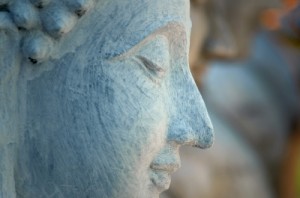
Most likely you’ve asked yourself some of the same questions I’ve been asked by […] students:
- “People keep telling me to be myself, but I don’t really know who that is. I feel pulled in so many directions.”
- Do we have free will, at all? Or are we totally determined by our genes, and conditioned by our environment?”
- “Why, in the midst of all they have, are so many people angry and dissatisfied? Can I hope to avoid this? Why is there so much addiction? Why depression, among people who have so much to offer?”
- “I haven’t found any kind of God I can believe in, yet I somehow feel there is something more to life. Your thoughts?”
- “Are science and religion looking at the same world? They seem so contradictory. Your husband is a physicist. Do you argue about this?”
- “Is there such a thing as truth? Is there anything I can be certain of?”
- “Do you think life has some kind of point, or meaning? Or is it, as Shakespeare said, ‘a tale told by an idiot’? It really feels that way. Then all of sudden, even though I have no real answers, the feeling goes away.”
She also asks what role contemplative practices should play in education and academic life and what they might have to do with the study of science, or the humanities and the arts. Should they have a place in the curriculum?
 Contemplative practice can encourage the ability to focus and enter into a subject with minimal distraction and interruption. It can help a great deal with stress reduction.
Contemplative practice can encourage the ability to focus and enter into a subject with minimal distraction and interruption. It can help a great deal with stress reduction.
Moving more deeply, it can foster the capacity to hold apparent contradictions in tension with each other without immediate dismissal of one side. It can encourage you to listen to and help develop the ideas of others from a less egoic perspective—and to see connections between disciplines that infuse their understanding of each other. It helps provide the space for deeper creativity and inspiration.
At its most profound level, contemplative practice has the potential to help you reconnect with a deeper sense of purpose, meaning, and value in your life.
This spring term Kathy Brownback taught a class in Mysticism for uppers and seniors.
From the course description:
It has been said that all religions converge in the contemplative tradition—the great world illuminated by the swamis and yogis of Hinduism, the core meditation practices of the Buddha, the Kabbalist teachers of Judaism, the Sufis of Islam, and the Christian mystics. What can we learn by reflecting on their teachings and their practices? How do they connect with current research on the mind-body connection? How do these make possible a deeper sense of self, or what we might call the “unique self”? What does it mean to speak of wisdom as a kind of knowledge? We will consider selections from all the major faiths, from the ancient texts of the Upanishads to the poets Rumi and Meister Eckhart to modern writers such as Marc Gafni and Pema Chodron.
